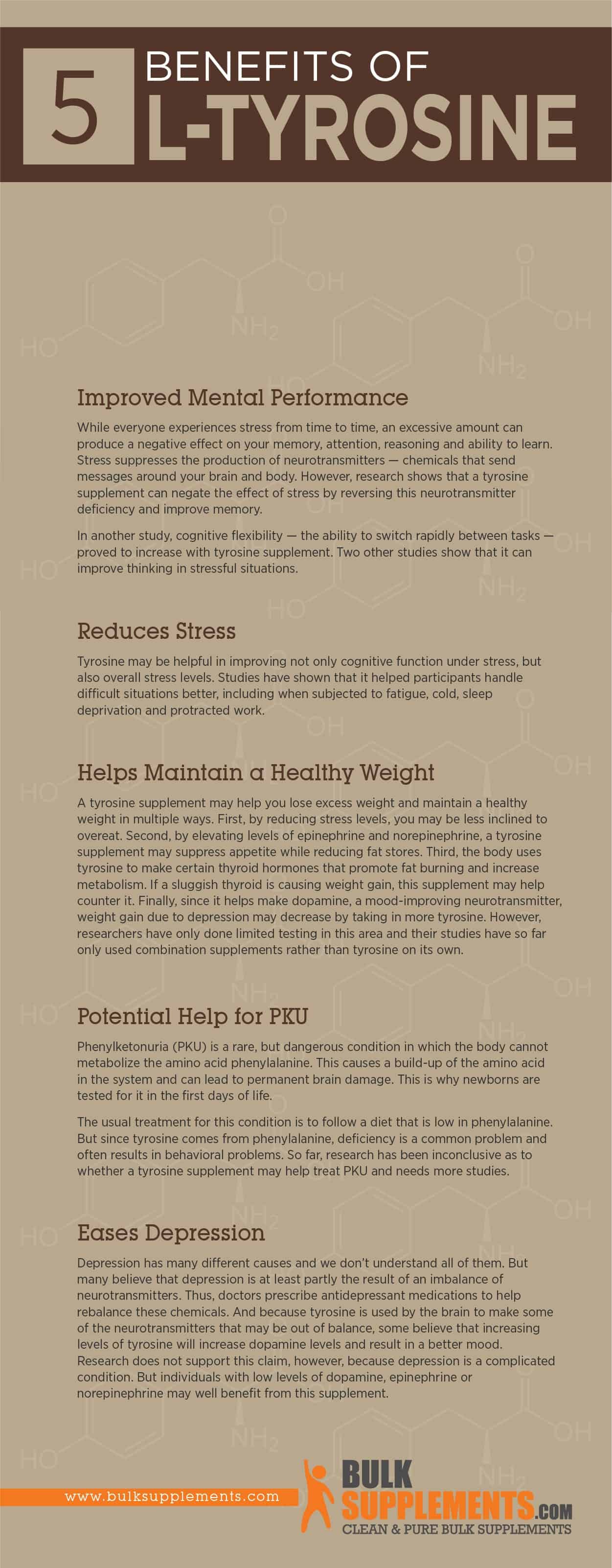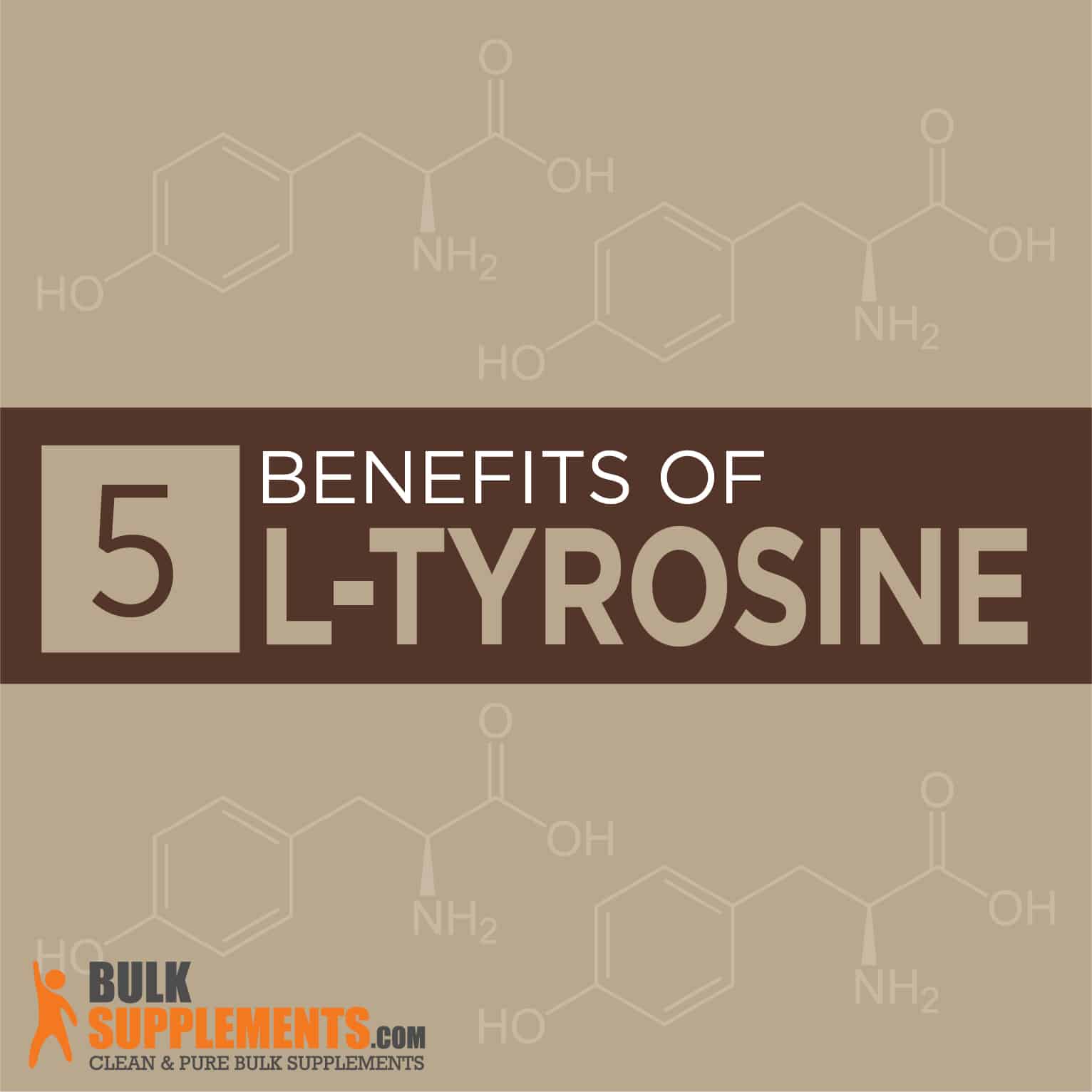Updated: 1/12/24
Have you ever felt completely drained and unmotivated after a stressful day? You’re not alone. In today’s busy world, it’s becoming increasingly difficult to keep stress levels low and maintain mental clarity. Thankfully, there is a natural supplement that may help – L-tyrosine. As an amino acid building block of proteins, L-tyrosine plays an important role in the production of neurotransmitters like dopamine, adrenaline, and norepinephrine that regulate focus, motivation and the stress response. In this post, I’ll explain what L-tyrosine is, how it works in the body and why you may want to consider adding it to your supplement routine if you frequently face mental fatigue due to stress or demanding cognitive tasks. By improving neurotransmitter synthesis, L-tyrosine supplementation could help boost your mood, energy levels and cognitive performance so you can navigate life’s challenges with greater mental resilience. Let’s dive into the research.
What is L-Tyrosine?
L-Tyrosine is an amino acid that provides many health benefits to our body. It is produced naturally within our bodies but can also be found in various food sources, such as almonds, chicken, turkey, dairy products, and soy products. L-Tyrosine is a building block of various neurotransmitters, including dopamine, adrenaline, and noradrenaline, which control mood, focus, and cognitive abilities. Therefore, taking L-Tyrosine supplements can be beneficial for those who want to enhance their cognitive abilities, focus, and memory.
L-Tyrosine works by supporting the production of the neurotransmitters mentioned above. When we take L-Tyrosine supplements, our brain receives a boost of this essential amino acid, which can help with mental alertness and improve cognitive abilities. In addition, L-Tyrosine can also help reduce stress levels and boost overall mood, aiding in a positive emotional state. Therefore, L-Tyrosine supplements can significantly benefit individuals who experience high levels of stress or require heightened focus for their daily tasks.
L-Tyrosine has been utilized in the traditional medicinal practices of ancient cultures such as the Greeks. The ancient Greeks used the herb as a remedy to treat insomnia, nervousness, and mental exhaustion. Additionally, the Chinese have included it in their medicinal practice for centuries, utilizing it when combating fatigue and stress. Growing research suggests that L-Tyrosine can provide numerous health benefits, including supporting the immune system, reducing inflammation, and improving thyroid function.
L-Tyrosine Benefits
May Help with Stress Management
One of the most significant benefits is its ability to help manage stress. Stress can have a detrimental effect on your health, leading to everything from high blood pressure and heart disease to depression and anxiety. L-Tyrosine can help your body produce more of the neurotransmitters that regulate stress and improve your mood, helping you feel more relaxed and in control.
May Improve Cognitive Function
It shows to improve cognitive function, helping you stay focused and alert. It works by increasing the production of dopamine and other neurotransmitters that can help improve concentration, memory, and learning. This makes it an excellent supplement for those who want to stay sharp and on top of their game.
May Enhance Mood
As mentioned earlier, it plays a crucial role in the production of dopamine, the neurotransmitter that controls mood. By increasing the levels of dopamine in the brain, L-Tyrosine can help alleviate depression, apathy, and other mood disorders. It can also help improve motivation and social behavior.
May Prevent Burnout and Fatigue
It is essential for the production of adrenal hormones which control the body’s response to stress. It helps to manage and regulate stress levels and reduces the impact of stress on your body and mind. Avoid burnout and chronic fatigue while maintaining the quality of your life with L-Tyrosine supplementation.
May Reduce Symptoms of Depression
Finally, it has been shown to help reduce symptoms of depression. It works by increasing dopamine levels in the brain, which can help improve mood and reduce feelings of sadness and hopelessness. If you’re struggling with depression, adding L-Tyrosine to your diet may be an effective way to manage your symptoms and improve your overall well-being.
May Increase Physical Endurance
If you’re an athlete or someone who loves to work out, you’ll be pleased to know that L-Tyrosine can also help increase physical endurance. It shows to improve muscle strength and reduce fatigue, allowing you to work out longer and harder without feeling exhausted. This can help you achieve your fitness goals and feel more confident in your abilities.
May Help Treat Phenylketonuria
Phenylketonuria (PKU) is a genetic disorder that prevents the body from properly breaking down amino acids, which can lead to severe health complications. L-Tyrosine is one of the amino acids that PKU patients have trouble metabolizing, but by taking it in a supplement form, they can still get the benefits without the negative effects. Additionally, L-Tyrosine supplementation can help improve motor skills and behavioral problems in PKU patients.
Supports Thyroid Health
It is essential in the production of thyroid hormones, which regulate metabolism, body temperature, and energy levels. If you have an underactive thyroid, supplementing with L-Tyrosine can improve symptoms like fatigue, weight gain, and low mood. Additionally, L-Tyrosine shows to improve symptoms of hyperthyroidism, a condition where the thyroid gland produces too many hormones.
May Help with Weight Loss
It helps with weight loss by increasing the production of thyroid hormones, which are responsible for regulating metabolism. By boosting metabolism, L-Tyrosine can help you burn calories faster and lose weight more efficiently.
May Boost Metabolism
Another benefit of L-Tyrosine is its ability to boost metabolism. This can help you burn more calories and lose weight more effectively. It does this by supporting the production of thyroid hormones, which regulate metabolism and energy levels. This makes it an excellent supplement for those looking to lose weight or maintain a healthy weight.
Promote Healthy Skin
It is converted by your body into melanin, a pigment that gives your skin a natural tan. It minimizes sunburn damage and provides better protection against UV radiation. Supplementing with L-Tyrosine can give you a natural, bronzed look without having to damage your skin with artificial tanning products.

L-Tyrosine Side Effects
Gastrointestinal Issues
One of the most common negative side effects is gastrointestinal issues, including nausea, diarrhea, and stomach cramps. L-Tyrosine can cause these problems because it increases the production of stomach acid. If you have a sensitive stomach or a history of gastrointestinal issues, you may want to avoid L-Tyrosine or start with a low dose to see how your body reacts.
Headaches
Another common negative side effect is headaches. Some people report experiencing mild to severe headaches after taking L-Tyrosine. This may be due to the fact that L-Tyrosine increases dopamine levels in the brain, which can cause headaches in some people. If you experience headaches after taking L-Tyrosine, you should stop taking the supplement and consult with your healthcare provider.
High Blood Pressure
It can also cause an increase in blood pressure, which can be dangerous for people with hypertension. The reason for this is that L-Tyrosine can increase the production of norepinephrine, which can cause blood vessels to constrict and increase blood pressure. If you have high blood pressure, you should avoid L-Tyrosine or speak with your healthcare provider before taking the supplement.
Agitation and Anxiety
It can cause agitation and anxiety in some people. This is because it increases the production of dopamine and norepinephrine, which are both neurotransmitters involved in the body’s stress response system. If you have a history of anxiety or panic attacks, you should avoid L-Tyrosine or talk to your healthcare provider before taking the supplement.
Insomnia
Finally, L-Tyrosine can cause insomnia in some people. This is because it increases the production of dopamine, which is a neurotransmitter involved in the body’s sleep-wake cycle. If you have trouble sleeping or suffer from insomnia, you should avoid L-Tyrosine or start with a low dose to see how your body reacts.
Dosage
The recommended dosage varies based on age, weight, and health condition. Generally, healthy adults can take between 500 mg to 2000 mg of L-Tyrosine daily. However, it’s always best to check with your healthcare provider before starting any supplement.
The Bottom Line
L-Tyrosine is a versatile supplement that has many benefits for both physical and mental health. It’s a safe and effective way to improve cognitive function, reduce stress, and support thyroid health. If you’re an athlete looking to improve performance or someone who wants to stay focused and motivated, L-Tyrosine might be right for you. It’s always best to consult with a healthcare professional before starting any new supplement regimen, but with its many benefits, it is definitely worth considering.
While it can provide many benefits, it is important to be aware of the potential negative side effects before taking the supplement. Gastrointestinal issues, headaches, high blood pressure, agitation and anxiety, and insomnia are all potential side effects of L-Tyrosine. If you experience any of these side effects, you should stop taking the supplement and consult with your healthcare provider. It is also important to note that it can interact with other medications and supplements, so it is always a good idea to speak with your healthcare provider before adding L-Tyrosine to your regimen. Overall, L-Tyrosine can be a helpful supplement for some people, but it is important to proceed with caution and be aware of the potential negative side effects.
These statements have not been evaluated by the Food and Drug Administration. These products are not intended to diagnose, treat, cure or prevent any disease.


